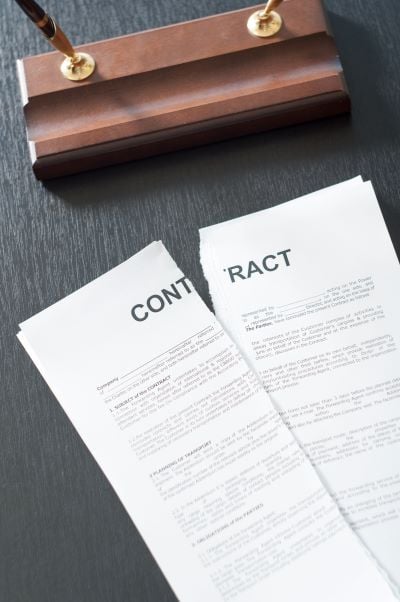3 min read
San Jacinto River Authority v. City of Conroe: Contract Claims Survive Immunity Plea
The San Jacinto River Authority entered into long-term water supply contracts with the City of Conroe and the City of...
The Contract Disputes Act (CDA) is a crucial federal law that governs contracts, both express and implied, executed by an executive agency of the U.S. government for various purposes such as procurement of property, services, construction, real estate activities, or disposal of personal property. Under the CDA, contractors initiating a claim against the government under a contract must first submit a written claim to the contracting officer. If the claim is dismissed by the contracting officer, the contractor has the option to seek review by either filing a lawsuit in the United States Court of Federal Claims or requesting a review by an agency board of contract appeals.
The CDA outlines specific procedures for resolving contract disputes, including addressing disputes over the terms of the contract. For instance, any funds, including interest, obtained from a contractor due to a claim made by a military department or Defense Agency must be retained to settle the claim, any favorable judgments on appeal to the Armed Services Board of Contract Appeals, or any favorable court judgments in the contractor's favor.

Furthermore, the CDA allows contractors and contracting officers to utilize alternative dispute resolution methods or other agreed-upon procedures to settle claims. Contractors are required to certify claims when necessary by law or subsection requirements.
The CDA also safeguards contractors' rights by enabling them to appeal a contracting officer's decision to an agency board within 90 days of receiving the decision. Alternatively, contractors can opt to directly challenge the decision in the United States Court of Federal Claims within the specified time frame.
In subcontractor cases where the prime contractor acts as an agent of the government, the Contract Disputes Act grants jurisdiction to the Board over appeals, as illustrated in the A & B FOUNDRY, INC. case. In the realm of cybersecurity, the Department of Defense has advised procurement officials that non-compliance with cybersecurity standards could result in breach-of-contract claims or grounds for termination for cause under the CDA.

A lawyer well-versed in the Contract Disputes Act (CDA) plays a crucial role in assisting government contractors navigate the intricate process of resolving contractual conflicts with the federal government. The CDA, as established in United States v. J & E Salvage Co., 55 F.3d 985, provides a comprehensive framework for addressing such disputes.
One key aspect where a contract lawyer's expertise shines is in aiding contractors in the proper submission of claims related to government contracts, as illustrated in United Aeronautical Corp. v. United States A.F., 80 F.4th 1017. In cases where a contractor faces an unfavorable ruling by a contracting officer, the contract attorney can provide valuable legal advice and support in lodging an appeal either with an agency board of contract appeals or the United States Court of Federal Claims, following precedents like Winter v. Floorpro, Inc., 570 F.3d 1367.
Moreover, the lawyer ensures that all contractor claims against the government adhere to the CDA's requirement of a written submission to the contracting officer for a decision, as emphasized in BLR Group of Am., Inc. v. United States, 96 Fed. Cl. 9. It is also the lawyer's responsibility to clarify the distinct types of claims under the CDA, encompassing those initiated by the government against a contractor and vice versa, as evidenced in Lockheed Martin Aero. Co. v. Sec'y of the A.F., 66 F.4th 1329.
Additionally, the lawyer guarantees that the contractor fulfills specific administrative prerequisites essential for pursuing legal action under the CDA, in alignment with cases like Sys. Application & Techs., Inc. v. United States, 491 F. Supp. 3d 73. Lastly, the lawyer educates the contractor on the critical time constraints for submitting claims under the CDA, a fundamental aspect highlighted in Menominee Indian Tribe of Wis. v. United States, 614 F.3d 519.

A Contract Disputes Act (CDA) claim can be filed either with the contracting officer or with the U.S. Court of Federal Claims or an agency board. It is crucial for a contractor to submit their claim to the contracting officer within six years after it accrues, as mandated by the CDA. This initial submission to the contracting officer is a necessary step for pursuing a CDA action in the U.S. Court of Federal Claims or for seeking an appeal to a board of contract appeals.
Upon the contracting officer making a decision, the contractor is presented with two courses of action. Firstly, within 90 days of receiving the contracting officer's decision, the contractor can choose to appeal to an agency board. Secondly, as an alternative, the contractor may opt to directly pursue the claim in the United States Court of Federal Claims within 12 months following the receipt of the contracting officer's decision. It is essential for contractors to be aware of these timelines and procedural requirements outlined in relevant legal cases and statutes to ensure their claims are filed and appealed appropriately.
It is worth noting that the six-year time limit imposed by the Contract Disputes Act of 1978 does not apply to contracts awarded before October 1, 1995. This exception underscores the importance of understanding the specific guidelines and limitations that govern contract disputes, especially with regard to the timeframe within which claims must be initiated.

The Contract Disputes Act (CDA) provides a comprehensive statutory system for resolving government contract disputes. It offers two opportunities for review of an adverse determination by a contracting officer. A contractor may either appeal the decision to an agency board of contract appeals or may seek judicial review in the Court of Federal Claims. The CDA is designed to provide a fair, balanced, and comprehensive system of legal and administrative remedies in resolving government contract claims. It also provides a process for dispute resolution of certain contract claims against the government. The CDA encourages the use of Alternative Dispute Resolution (ADR) procedures for pre-claim and pre-final decision matters, as well as appeals pending before the Board. The purpose of an equitable adjustment is to make the contractor whole. One of the prime purposes of the CDA is to provide a "fair" and "balanced" system to negotiate and resolve contract claims.

The Contract Disputes Act (CDA) is a critical framework for resolving disputes linked to federal procurement contracts. Contractors have the right to present written claims to agency contracting officers and obtain decisions within a set timeframe. If they disagree with a contracting officer's decision, they can appeal to an agency board within 90 days or directly to the United States Court of Federal Claims within 12 months.
The appeal to the agency board must be in writing and provided to the contracting officer. For claims under $100,000, contractors can opt for the board's small claim or accelerated procedure. In cases where the contracting officer delays issuing a decision, the contractor can appeal by citing the officer's inaction. Appeals of decisions from the agency board or the Court of Federal Claims can be made to the U.S. Court of Appeals for the Federal Circuit.

Under the Contract Disputes Act, a government contractor must satisfy three specific requirements to ensure the validity of their claim. Firstly, it is imperative that the contractor submits the demand in writing to the contracting officer, as outlined in 41 USCS § 7103(a)(1) and (a)(2) § 7103, supported by the ruling in H.L. Smith, Inc. v. Dalton, 49 F.3d 1563. Secondly, the demand must be classified as a matter of right, denoting the contractor's pursuit of payment in a precise sum, adjustments or interpretations of contract terms, or any other relief linked to the contract, as indicated in K-Con Bldg. Sys. v. United States, 778 F.3d 1000.
Additionally, for claims exceeding $100,000, the contractor is obliged to certify, under § 7103, that the claim is made in good faith, the supporting data are entirely accurate and comprehensive to the contractor's knowledge and belief, the requested amount aptly corresponds to the contract adjustment believed to be owed by the Federal Government, and the certifier is duly authorized to act on the contractor's behalf.
Moreover, the submission of the claim must be completed within six years following its accrual, except in instances of fraud as stipulated under § 7103. It is vital that the claim contains a definite and explicit statement, offering the contracting officer a clear understanding of the basis and amount of the claim, in alignment with K-Con Bldg. Sys. v. United States, 778 F.3d 1000, 52.233-1 Disputes.
Lastly, procuring a final decision on the claim from the contracting officer acts as a crucial prerequisite for the adjudication of said claim in the Claims Court. This prerequisite is strategically set to foster informal dispute resolution opportunities at the contracting officer level and to ensure lucid notification concerning the content of contract claims, a concept supported by Tolliver Grp., Inc. v. United States, 20 F.4th 771.
The Contract Disputes Act (CDA) comprehensively covers disputes arising from government contracts. It applies to both express and implied contracts entered by executive agencies for various purposes, including procurement, services, construction, real estate activities, and disposal of personal property. For example:
Requests for Equitable Adjustment (REA): When the government causes increased costs or delays due to changes in the contract specifications or other actions, contractors can file an REA for fair compensation.
Monetary Claims: These include claims for payment for work performed, reimbursement for allowable costs, or interest on overdue payments.
Non-Monetary Claims: Contractors can use the CDA to seek adjustments to contract terms, like extending deadlines due to unforeseen circumstances.
While the CDA covers a wide array of disputes, it's important to note exceptions.
Breach of Contract Claims: The CDA focuses on disputes arising during contract performance. Breaches that occur after completion (e.g., government failing to accept completed work) might not be covered.
Claims for Personal Injury or Property Damage: These typically fall under separate legal procedures.
Claims arising before 1979: The CDA only applies to contracts entered into on or after November 1, 1978.
Claims Based on Government Policy or Regulations: Disagreements overbroad government policies or regulations generally fall outside the CDA's scope.
The Contract Disputes Act (CDA) sets out specific procedures for resolving disputes between contractors and the federal government, with a focus on compliance to avoid severe consequences. Adherence to the dispute resolution processes outlined in the CDA is vital for the United States Court of Federal Claims to have jurisdiction over claims falling under this act. In cases where a contractor fails to initially present their claim to the contracting officer for decision, there is a risk that the court may lack jurisdiction over an appeal of the contracting officer's decision, as seen in Claude Mayo Constr. Co. v. United States, 128 Fed. Cl. 616.
Additionally, the CDA mandates that contractor claims exceeding $100,000 must be certified. Failure to appropriately certify such claims under the CDA can result in a contracting officer not being obliged to issue a final decision on the claim. However, it's important to note that a flaw in the certification process does not strip a court or an agency board of its jurisdiction over the claim, as indicated in § 7103 – Decision by contracting officer.
Furthermore, the CDA restricts agency heads from settling, compromising, paying, or adjusting any claim related to fraud. If a contractor is unable to substantiate any part of their claim due to misrepresentation or fraud, they may face liability under § 7103 – Decision by contracting officer.
Lastly, the CDA is applicable to both express and implied contracts, establishing a structured administrative review process with multiple tiers. Noncompliance with this process may curtail the potential remedies accessible to a party involved in a Federal Government contract, as showcased in Davis v. United States Marshals Serv., 849 Fed. Appx. 80. Thus, it is imperative for contractors to adhere to the procedures delineated in the CDA to ensure their claims receive proper consideration and resolution.
The Contract Disputes Act (CDA) guides the assessment of damages, wherein a contractor's written demand stands as a claim if it expressly asserts rights, specifies relief sought, demands a final decision, and is part of an existing dispute as per M. Maropakis Carpentry, Inc. v. United States, 84 Fed. Cl. 182.
Certification of the requested amount aligning with the contractor's belief of the government's liability is essential as per Colon v. United States, 35 Fed. Cl. 337. Any increase in a CDA claim's amount in court must stem from facts presented earlier to the contracting officer, with the contractor being unaware of justifying factors at the claim's initial submission, per Flandreau Santee Sioux Tribe v. United States, 610 F. Supp. 3d 1225.
A CDA claim lacking a specific figure can be salvaged through a simple calculation or documentary evidence aiding the contracting officer's assessment, based on Flandreau Santee Sioux Tribe v. United States, 610 F. Supp. 3d 1225. While a claim can surpass the initially stated amount, it must still originate from the initial certified claim, detailed in SMS Data Products Group, Inc. v. United States, 19 Cl. Ct. 612.
The Court of Federal Claims delves into whether the claim centers on the same facts, legal grounds, and relief sought as presented to the contracting officer, referenced in BTR Enters. of SC, LLC v. United States, 2018 U.S. Claims LEXIS 1029. In a contract dispute, the damages aim to restore the non-breaching party to the position if the breach had not occurred, in accordance with Frisby v. Solberg, 2016-Ohio-7644.
Monetary and nonmonetary claims under the Contract Disputes Act (CDA) present distinct characteristics. A monetary claim is a contractor's written demand for a specific sum of money owed, as established in the case of Clearwater Constructors, Inc. v. United States, 56 Fed. Cl. 303. It is required to provide a clear and unambiguous statement that informs the contracting officer of the claim's basis and amount, following the precedent set by Monterey Consultants, Inc. v. United States, 159 Fed. Cl. 641. Additionally, if the claim surpasses $100,000, the contractor must certify the accuracy of supporting documentation and the contract adjustment, as indicated in Sys. Application & Techs., Inc. v. United States, 491 F. Supp. 3d 73. Notably, the absence of a specific sum in a monetary claim can invalidate jurisdiction under the CDA, as highlighted in the same case.
In contrast, a nonmonetary claim involves a contractor's written request for the adjustment or interpretation of contract terms, as illustrated by Clearwater Constructors, Inc. v. United States, 56 Fed. Cl. 303. Unlike in monetary claims, there is no mandate for the contractor to specify a sum in a nonmonetary claim. The contractor is, however, obligated to delineate specific contractual and legal grounds to substantiate the claim, in line with the principles elucidated in Sys. Application & Techs., Inc. v. United States, 491 F. Supp. 3d 73. The Court of Federal Claims in the United States holds jurisdiction over certain nonmonetary claims permitted under the CDA, as further confirmed in Parker v. United States, 77 Fed. Cl. 279.
Contractors are obligated to clearly state a specific sum in their claims and cannot circumvent this requirement by disguising monetary claims as nonmonetary ones. Courts play a vital role in determining whether a claim should be classified as monetary or nonmonetary based on the actual nature of the allegations rather than how they are framed. If pursuing declaratory relief ultimately results in obtaining monetary compensation from the federal government, the nature of the claim shifts to a monetary one, as illustrated in the case of Sys. Application & Techs., Inc. v. United States, 26 F.4th 163.
The Contract Disputes Act underscores the critical role of the contracting officer in resolving disputes that may arise during contract execution. Endowed with the authority to determine contract awards in compliance with solicitation terms, the Federal Acquisition Regulation (FAR), and other governing regulations, the contracting officer assumes a central role in the dispute resolution process. In the event of a disagreement between the government and the contracting party post-contract award, the contractor has the right to directly present the dispute to the contracting officer for resolution. Subsequently, the contracting officer's decision is subject to review by an agency board or the Claims Court, as exemplified in the case of CACI Inc.-Federal v. United States, 67 F.4th 1145.
It is noteworthy that the contracting officer holds the authority to revisit their final decision if deemed necessary. Although the Contract Disputes Act does not prescribe a specific format for claim submissions, it does require contractors to furnish a clear and comprehensive written statement to the contracting office, ensuring that the contracting officer is adequately informed about the basis and amount of the claim (§ 7103 Decision by contracting officer).
Expanding on these directives, the Federal Acquisition Regulation provides detailed insights into the prerequisites of the Contract Disputes Act. It delineates the procedural steps that a contracting officer must adhere to when the government intends to assert a claim against a contractor. These steps encompass a meticulous examination of relevant facts, consultation with appropriate advisors, coordination with the contract administering office, and issuance of a comprehensive written decision. Furthermore, the regulation stipulates that contracting officers are required to seek and take into account advice from specialists such as auditors, legal advisors, engineers, and other relevant experts to effectively discharge their responsibilities (1.602-2 Responsibilities).
Upon issuance of a decision by the contracting officer, its finality is established upon the contractor's receipt. However, if the contracting officer chooses to reassess the decision following a timely reconsideration request, the finality of the decision remains pending until a resolution is reached during the reconsideration process (§ 7104 Contractor’s right of appeal from decision by contracting officer).
The Contract Disputes Act (CDA) enables the government to terminate a contract for its convenience, effectively changing it from a fixed price to a cost reimbursement contract. In such cases, the contractor is entitled to recover all allowable costs related to the terminated work, along with a reasonable profit and specific additional expenses. The aim of a termination for convenience settlement is to ensure fair compensation for the contractor and to cover all costs incurred, including unabsorbed overhead (Bowman Constr. Co. v. United States, 154 Fed. Cl. 127).
Under the CDA, contractors have the right to proceed under the Act for any claim either pending at the Act's effective date or initiated thereafter. It's important to note that the date of termination for convenience does not retroactively apply to the original default termination date, particularly in cases of disputes over the amount due following a convenience termination (§ 7104 Contractor’s right of appeal from decision by contracting officer).
Moreover, every claim by a contractor against the Federal Government concerning a contract must be formally submitted in writing to the contracting officer for a decision within 6 years of the claim's accrual (§ 7103 Decision by contracting officer). For claims exceeding $100,000, contractors must certify the claim's good faith, accuracy of supporting data, correctness of the requested amount reflecting the liability, and the authority of the certifier to act on behalf of the contractor.
In addition to the CDA, the Federal Acquisition Regulation (FAR) offers guidance on termination for convenience, emphasizing fair compensation for completed work, preparations made, and a reasonable profit. The costs recoverable by the contractor post-termination for convenience are outlined in the parties' agreement and under the termination for convenience clause at 48 C.F.R. § 52.249-2, which specifies payment for completed services, incurred costs, settlement costs, and reasonable profit (49.201 General).
Contract law disputes can surface when there is a disagreement regarding the understanding or fulfillment of a contract's terms. For instance, in Zapata Hermanos Sucesores v. Hearthside Baking Co., the court compared U.S. and French contract law with respect to attorneys' fee shifting, pointing out that these distinctions stem from varying procedural rules of general applicability rather than actual differences in contract law standards. This case sheds light on the nuances of legal systems in different jurisdictions.
Similarly, in Seifert v. United States Home Corp., the court deliberated on the circumstances defining a dispute as directly linked to the subject matter of a contract, consequently making it eligible for arbitration. This highlights the importance of understanding the parameters that govern arbitration in contractual disagreements.
In the case of Standard Tallow Corp. v. KIL-Management A/S, the court was tasked with reconciling conflicting arbitration clauses within a contract, one mandating arbitration in London and the other in New York. Such instances underscore the significance of clarity and precision in drafting contractual provisions to avoid ambiguity and potential disputes.
These examples underscore how disputes in contract law often stem from differing interpretations of contract terms and the application of distinct legal principles, emphasizing the need for precision and foresight in contractual agreements.
The Contract Disputes Act (CDA) outlines a structured two-step process for addressing disputes concerning federal government contracts. Initially, the contractor must present each claim against the government to the relevant contracting officer for a decision. This claim must be a specific written demand seeking payment, contract term adjustment, or other related contract relief.
If the contractor is dissatisfied with the contracting officer's ruling, they have the option to challenge it in federal court. The CDA permits judicial review of agency decisions, following standards similar to those in the Administrative Procedure Act. Notably, the Court of Federal Claims holds exclusive jurisdiction over contract claim appeals under the CDA, while federal district courts handle maritime contract disputes against the U.S.
Importantly, the CDA allows for flexibility in the legal process, as a claim in a judicial complaint does not need to mirror the initial claim raised to the contracting officer but should stem from the same facts and seek similar relief. Timeliness is crucial in appeals – final default decisions must be appealed to the agency board within 90 days or to the federal court within 12 months of receipt.
Additionally, the CDA establishes specialized entities like the Armed Services Board of Contract Appeals and the Civilian Board of Contract Appeals to manage contract claims effectively. Encouraging amicable resolutions, federal agencies are urged to utilize alternative dispute resolution methods such as mediation, conciliation, and arbitration to settle disputes with Tribal Transportation Program beneficiaries.
The statute of limitations for filing a CDA claim is critical to note. Generally, a contractor must submit their claim to the contracting officer within six years of its accrual. However, there's an exception for contracts awarded before October 1, 1995, where the six-year limit might not apply. Exceptions may exist depending on the specific circumstances, so consulting with a lawyer familiar with government contracts is advisable.
Get Started in
 Discuss Your Claim
Discuss Your Claim  Explore Your Options
Explore Your Options  We Will Advocate For You
We Will Advocate For You


Dec 18, 2025 by Joe Whitcomb
The San Jacinto River Authority entered into long-term water supply contracts with the City of Conroe and the City of...
Dec 8, 2025 by Joe Whitcomb
International Brotherhood of Electrical Workers, Local 278, along with a group of individual workers, filed an action...
Nov 27, 2025 by Joe Whitcomb
Matthew Shive entered into a membership agreement with 24 Hour Fitness USA, LLC, which granted him access to the...
Colorado
300 Union Boulevard
Suite 200
Lakewood, CO 80228
(303) 534-1958 (local)
© 2026 · All Rights Reserved · Whitcomb, Selinsky, PC